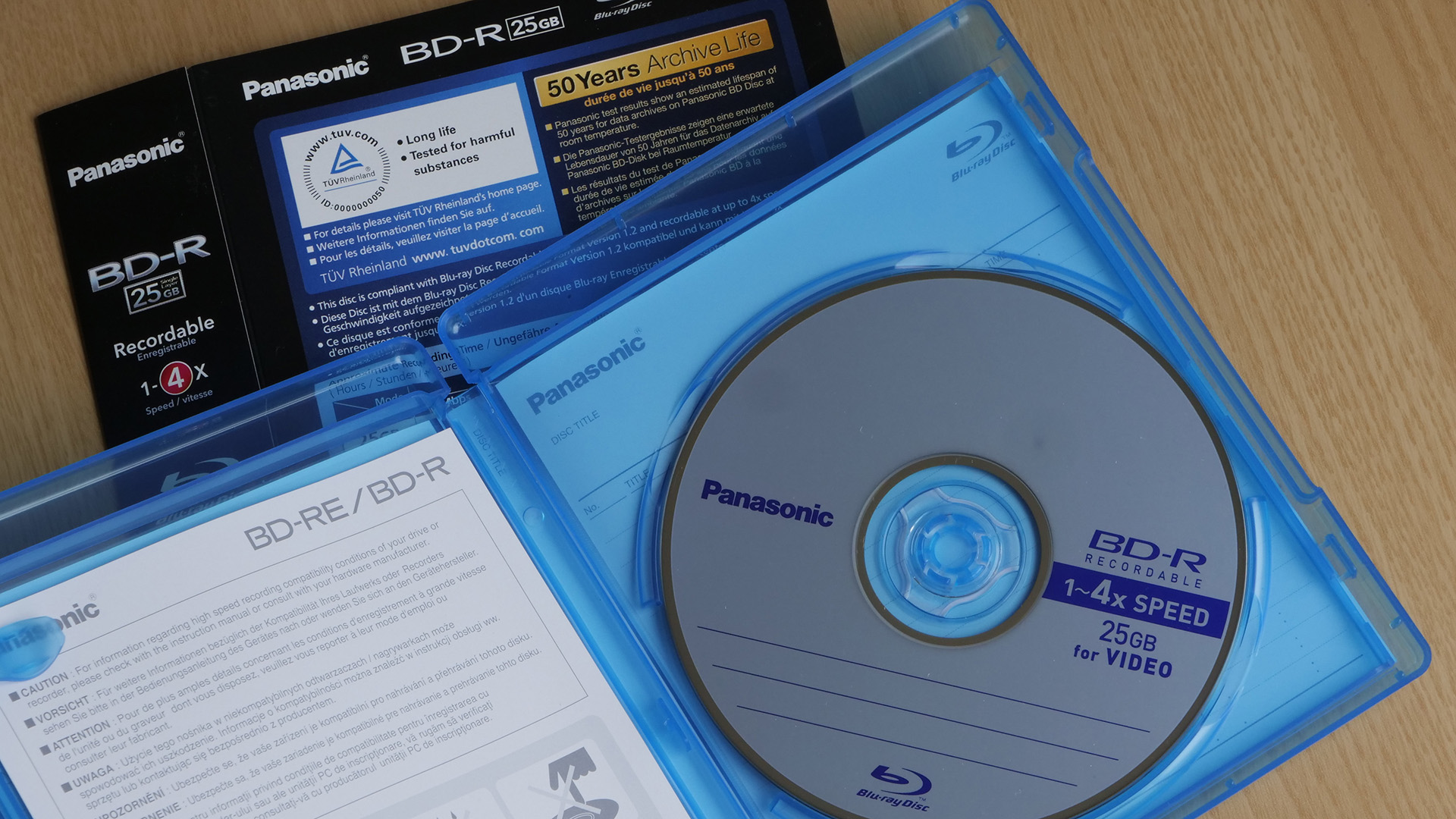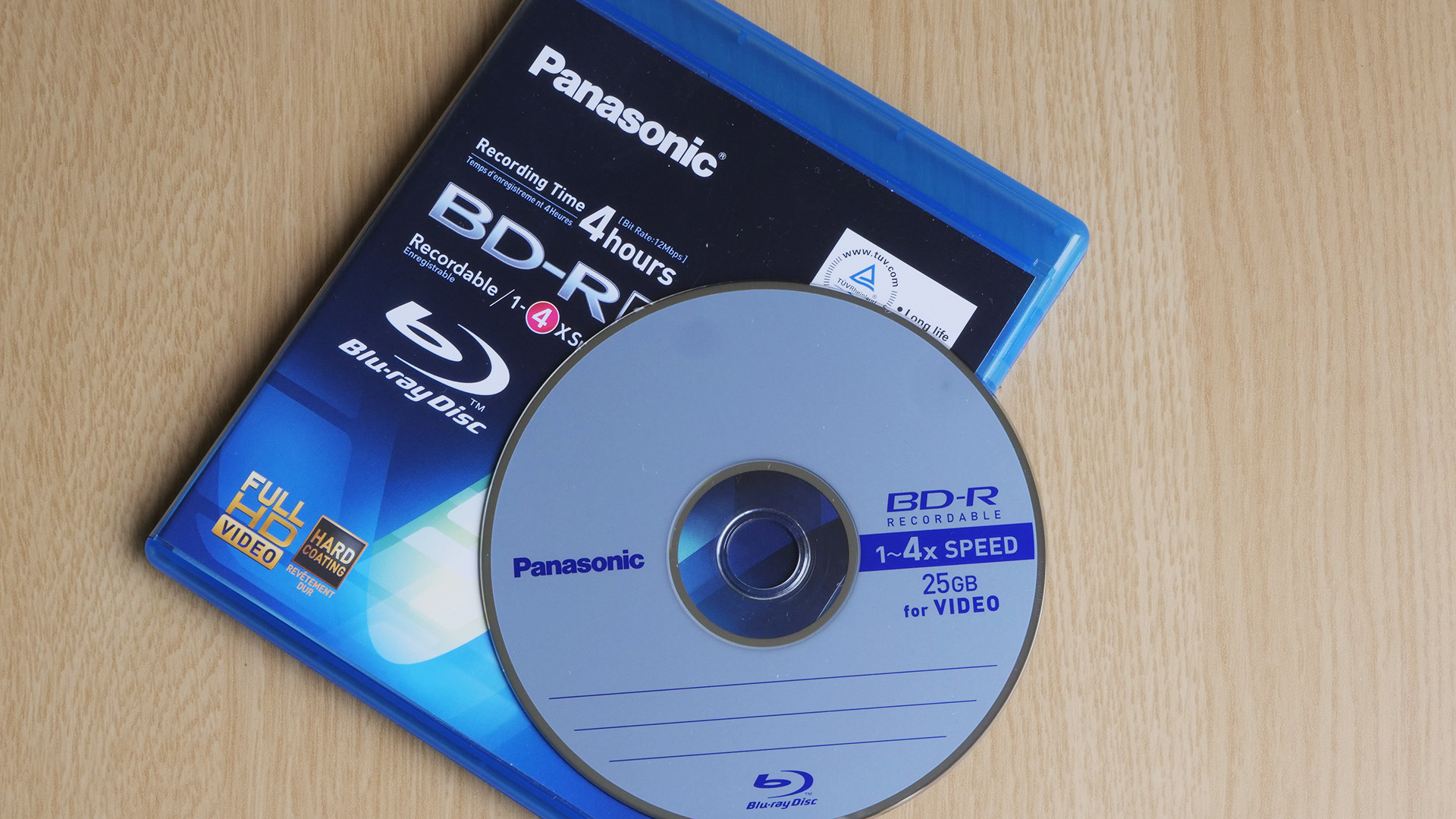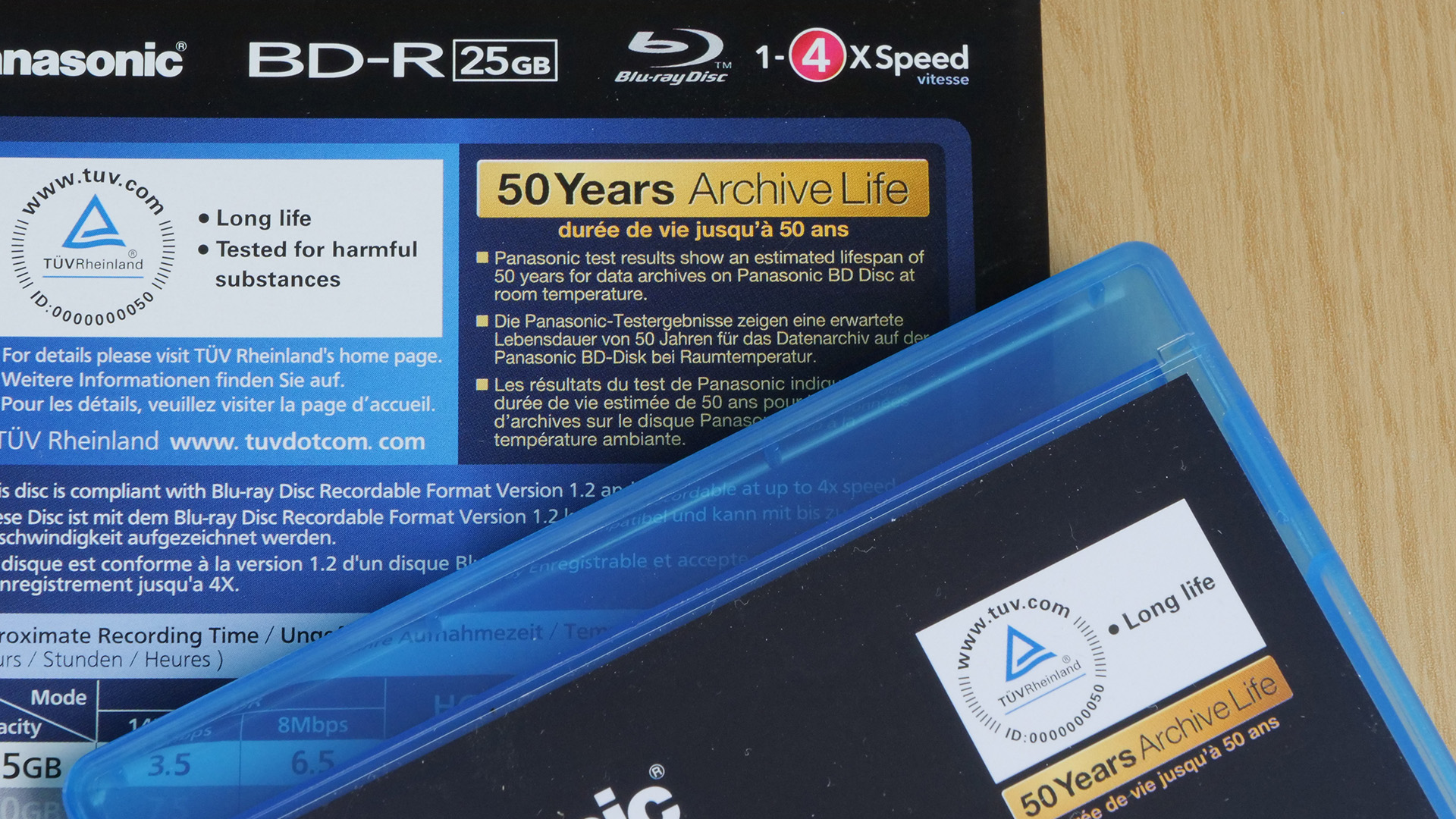There’s life left in Blu-Ray, so don’t kill off the BD-R just yet
Sales of Blu-Ray discs and player may have tanked but there’s no decent replacement for some of the things it can do


Get all the latest news, reviews, deals and buying guides on gorgeous tech, home and active products from the T3 experts
You are now subscribed
Your newsletter sign-up was successful
I’m really rather cross that Panasonic has killed off the recordable Blu-ray disc, at least as far as its own production is concerned. They stopped making them in February, citing falling demand for the discs, which they’d started producing back in 2006.
You might be surprised that I'm feeling angry about the demise of what might seem old, clunky and increasingly irrelevant technology. Optical discs have never been particularly convenient. Steve Jobs famously described Blu-ray, the third generation of the technology after CD and DVD, as “a bag of hurt”, mainly thanks to the complex licensing involved. Today we have the cloud and streaming media available anytime, anywhere in the very highest definition. Surely the technology’s ripe for retirement anyway.
The problem is that, despite their drawbacks, Blu-ray discs are still very good at a number of tasks for which there’s no real replacement, and if one of the long term champions of the technology is starting to give up on it, things aren’t looking bright for its future.
One thing they’re still very good for is as physical media for films and TV, at up to 4K resolution in their UHD form. Sales of movies on Blu-rays and DVD may be nosediving in the face of competition from streaming, but we’ve seen how content gatekeepers have started to change content they don’t feel is on-message or might be offensive in some way. The recent editing of Ian Fleming’s novels and Roald Dahl’s stories by “sensitivity readers” has reminded us that physical media may often be the only way of preserving the artist’s original intentions.
What’s the next thing tech companies or publishers deem to be something we shouldn’t be allowed to see? Perhaps you’ll re-stream the copy of Bulitt you thought you’d purchased only to find the car chase scenes have been deleted because they’re encouraging irresponsible driving, or the wanton use of oil. Other digital purchases may cease to exist when servers are taken offline or licensing agreements lapse. Sony for example announced in 2022 that hundreds of movie titles people purchased through the PlayStation store would no longer be accessible for licensing reasons.

You’ll have no such worries with a Blu-ray, making it practically the only way for movie enthusiasts to collect films in HD that won’t go missing or become incomplete overnight. Blu-ray could stay as a valuable and vibrant niche, like vinyl.
Several, “fourth generation” higher definition, higher capacity optical disc replacements have been announced but none has reached production (except for Sony’s archival cartridge system – see below) and none seem likely to. The Holographic Versatile Disc, for example, was touted to offer 6TB of capacity per disc but development fizzled out in the early 2010s.
Get all the latest news, reviews, deals and buying guides on gorgeous tech, home and active products from the T3 experts
The only practical Blu-ray replacements in the short term are the SSD and memory stick. This has a bit of a bit-rot problem – if the memory isn’t used it can lose its charge and disappear – but it may be the only option for movies in the future and at 8K.
Recording TV programmes for personal archives is another task where nothing beats the Blu-ray. The legality may be questionable but we’ve all felt grateful for amateur recordings that have ensured episodes of Dr Who or some other classic drama have survived a broadcaster’s wiping policies. In the streaming era such recordings may become even more valued.
At least Panasonic hasn’t stopped making its Blu-ray recorders yet. It is practically the only manufacturer though. Recording to USB from Freeview is possible but fraught with restrictions. My Sony TV for example won’t do it if you have YouView enabled, and even if you haven’t you can only play files back on the TV that recorded them. The files don’t even show up when you connect a drive to your PC. They’re certainly not the same instant archive provided by the Blu-ray disc.

My feeling of loss at the demise of BD-R doesn’t start and end with video. Perhaps even more importantly, it’s also a very useful backup medium for the home. BD-R discs can have an estimated 50 year life and they’re a great way of safely keeping reasonably large amounts of data that would be too expensive to store in the cloud or for which you’d like an additional non-cloud backup – priceless family photo collections or home videos for example.
Capacities range from 25GB to 100GB per disc. Compared to alternatives like regular hard drives, which are almost guaranteed to fail, SSDs that may lose their charge, and RAID drives which, while better, are also prone to catastrophic failure, Blu-rays can be very reassuring.
Discs will continue to be available from other manufacturers of course. Verbatim’s M discs for example also promise archival capabilities. But Panasonic’s discs were widely regarded as the best in the business and will therefore be missed in this vital role.
What else can you use for dependable physical backup? Sony has developed an optically-based high capacity storage system called “Archival Disc” but it’s too expensive for mass home use. The cheapest standalone recorders and playback units are around £5000, and a 1.2TB rewritable disc cartridge is just under £150.
Another alternative is modern, high capacity magnetic tape in the shape of the Linear Tape Open (LTO) format, which was introduced in the late 1990s and is now in its ninth generation. Again, expense is a barrier. Dell’s cheapest drive is around £4800 and an LTO9 18TB tape is about £120.
Clearly we need a revolutionary, new, cheap and convenient physical media format to replace the optical disc. Some have high hopes for the molecule that contains human genetic information, DNA, that may well have the capacity to store huge quantities of data indefinitely without consuming any energy once it’s stored.
Problems of retrieval are lessened if the DNA data files are encapsulated into small silica particles according to researchers at MIT. They say a coffee cup sized container could potentially hold all the world’s data. But it’s way in the future.
Meanwhile I think we should look to laser-etched silica glass as a Blu-ray replacement. 5D Optical discs developed by researchers at the University of Southampton offer fast and efficient optical storage that’s 10,000 times denser than Blu-ray and with the prospect of millions of years of life, all on attractive glass discs that hold up to 500TB of data. And discs could potentially be very small. We could send off our archives to be copied onto tiny jewels, or buy films we wanted to keep on them too. How useful, and delightful!

Jon is the main gadget reviewer and presenter for The Gadget Show on Channel Five. He was previously the Producer and Executive Producer of BBC's Top Gear between 1987 and 1999 and had a corner named after him on the Top Gear test track. He launched Fifth Gear for Channel Five and produced the show until 2004. When not presenting Jon enjoys writing. In 2019 Atlantic Books published his first book, Autopia: The Future of Cars, and he contributes regularly to Amateur Photographer magazine.